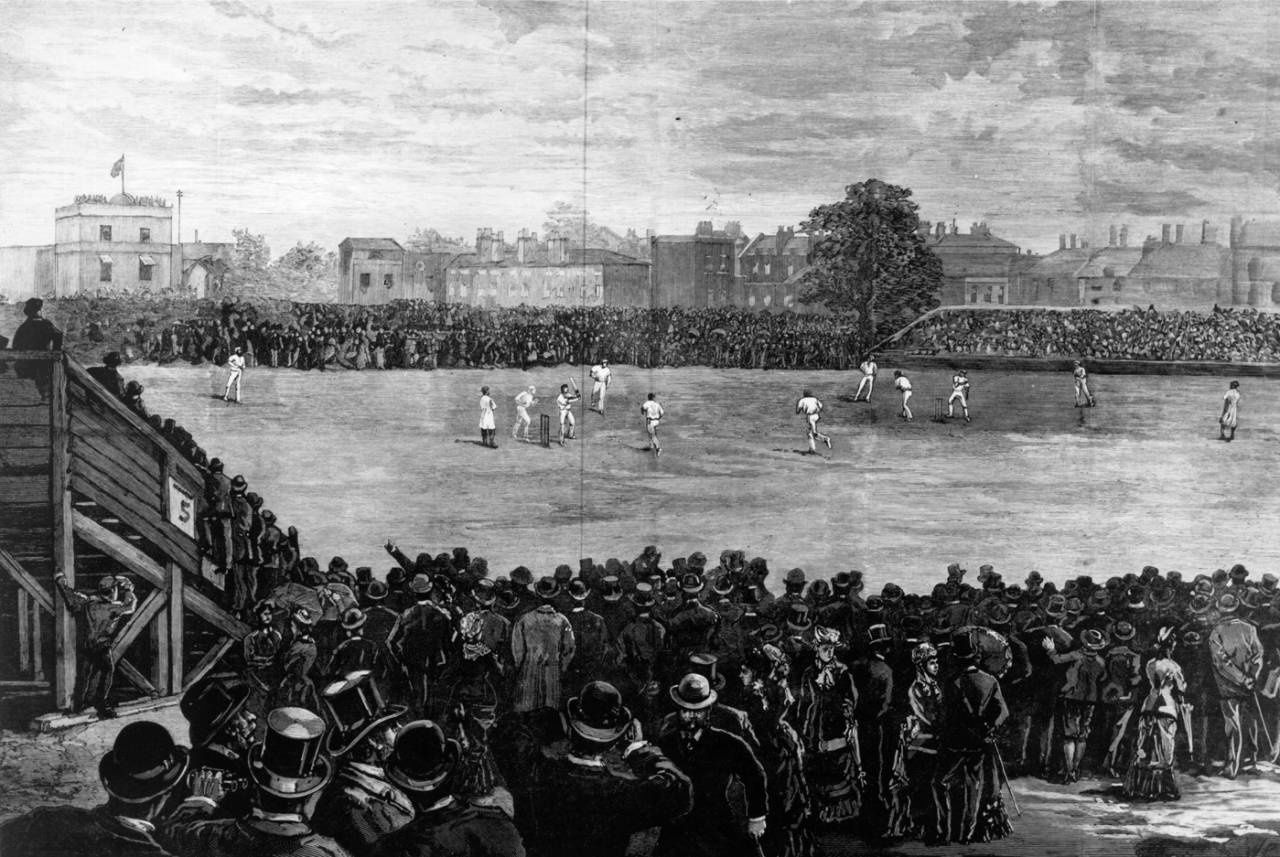The Demon demolishes England
The Ashes are born

An illustration of the 1882 Oval Test • Getty Images
The climax of one of the most famous Test matches of all time, the one that gave birth to the Ashes. Set only 85 to win at The Oval, England were 51 for 2 before WG Grace was out. After that, Fred Spofforth bowled Australia to an amazing win by seven runs. "The Demon" took 7 for 46 and 7 for 44, and a mock obituary of English cricket appeared in the Sporting Times.
West Indies won their first Test in England in 17 years. Twenty-three-year-old Shai Hope was the driving force behind the five-wicket win at Headingley, steering the 322-run chase with his second hundred of the game (he became the first batter to make two hundreds in a match in all first-class cricket at the venue). His batting partner for a significant part of the chase, Kraigg Brathwaite, narrowly missed out on the same record when he was dismissed for 95 in the second innings. Some may have questioned England captain Joe Root's decision to set a sporting target, but it was their seven dropped catches (a total of 14 by both teams in the match) that hurt England the most.
Graham Gooch (196) and his captain David Gower (157) completed a sumptuous stand of 351 against Australia at The Oval. England's innings win put the seal on a glorious summer for Gower, who scored 732 runs in the series, which England won 3-1 to regain the Ashes. Those two centuries were the last for England in an Ashes Test at The Oval until Mark Ramprakash's in 2001.
Australia batter Aaron Finch broke the world record for the highest score in T20Is when he blasted 156 off 63 balls in Southampton to take Australia to 248 - at the time, the second-highest total in T20Is. Finch started his innings with a six and reached every landmark on the way to his gargantuan score the same way: heaving across the boundary to get to his half-century (26 balls), his hundred (47), beating Brendon McCullum's innings record of 123, and his 150. In reply, England managed to get past 200 but lost by 39 runs. Finch surpassed his own record score in 2018 with 172 off 76 balls against Zimbabwe in Harare.
A top allrounder put in one of the top all-round performances. Yorkshire's George Hirst hit 111 and 117 not out and took 6 for 70 and 5 for 45 against Somerset in Bath. At the end of the season, in which he scored 2000 runs and took 200 wickets, he had every reason to say that if anyone ever matched the feat (they haven't) "he'll be tired".
Malcolm Nash improved on his performance against Garry Sobers. Relatively speaking, that is. In 1968, batting for Notts against Glamorgan in Swansea, Sobers hit Nash for six sixes in an over. Now, on the same ground, Lancashire's Frank Hayes settled for a four from the second ball of a Nash over, but smashed the rest for six. Poor Nash is the only bowler to concede 36 and 34 runs off separate overs.
Birth of England medium-pacer Alfred Shaw, who bowled the first ball in a Test match, in Melbourne in 1876-77. His second ball was hit by Charles Bannerman for the first run in Test cricket. Shaw conceded only 51 runs from 55.3 four-ball overs in the first innings. One of the greatest bowlers of his type, Shaw's 2075 first-class wickets cost only 12 each. When he died in 1907, he was buried according to his wishes: the length of a cricket pitch from the grave of his equally celebrated Notts and England team-mate Arthur Shrewsbury. Some time after the interment, someone discovered that the distance between the two tombs wasn't 22 yards but 27. Shock, horror. Luckily the county secretary remembered that Shaw always took a five-yard run-up!
One of Shaw's team-mates died on this day. Allen Hill not only played in that inaugural Test, he was the first bowler to take a wicket in a Test match, bowling Nat Thomson for a single. Hill's entire Test career consisted of the two matches in this 1876-77 series. His medium-paced seamers brought him seven wickets at only 18.57 and he made 101 runs at an average of 50.50. He was at the crease when England hit the winning runs in the second Test.
The first time Bangladesh took a first-innings lead. After Mohammad Rafique picked up five, Alok Kapali's hat-trick - the last three wickets - bowled out Pakistan for 295 in Peshawar. But the lead meant little once Shoaib Akhtar and Umar Gul ripped through Bangladesh in their second dig. First-innings centurion Javed Omar was dismissed for a first-ball duck and Habibul Bashar (97 in the first innings) top-scored with 28 as Bangladesh limped to 96. Pakistan won by nine wickets.
New Zealand's John Guy, born today, was a quick-footed left-hand batter whose solid defence and endless concentration were punctuated by the ability to hit the ball hard and high. In 1955-56 he toured India and Pakistan where he made 313 runs at 34.77, including a dour seven-hour 102 in Hyderabad. He played first-class cricket for five out of New Zealand's six domestic sides (Auckland being the only one he missed).
1857 Sandford Schultz (England)
1913 Len Butterfield (New Zealand)
1923 Hiralal Gaekwad (India)
1980 Mohammad Sheikh (Kenya)